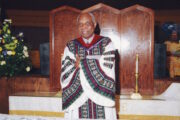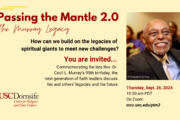The following was part of USC Cecil Murray Center for Community Engagement’s report on its Financial Fitness Program, sponsored by CIT/OneWest Bank.
Many people in America face financial challenges. According to the Federal Reserve, nearly one in four adults in America is not able to pay all of their current month’s bills on time. The same survey found that 44 percent of adults either could not cover an emergency expense of $400 or would cover it by selling something or borrowing money.
The Financial Industry Regulatory Authority (FINRA) 2015 National Financial Capability Study illustrates ways in which consumers could benefit from more effective habits and skills in money management. Many Americans say they did not comparison-shop before obtaining financial products such as a credit card. While many say they compared prices when shopping for a car, almost half of American adults surveyed said that they did not compare loan prices or terms before taking an auto loan.
According to FINRA, the study findings suggest that many student loan borrowers did not fully understand what they were getting into when they took out their loans. A majority of student loan borrowers said they did not try to estimate monthly payments when obtaining their most recent student loan, and a majority said that, if given the chance to do it all over again, they would take a different course of action. More than half of American adults surveyed in the FINRA study indicated they had not tried to figure out how much they need to save for retirement. The FINRA study also found that many American adults use credit in ways that increase the cost of that credit.
The Cecil Murray Center for Community Engagement’s CIT/OneWest Bank’s Financial Fitness Program (FFP) is designed to enhance financial capability by educating and empowering the faith-based community to address the types of financial decisions, opportunities and challenges that arise throughout the financial life cycle. We intend to help people to be prepared as consumers and to equip themselves to make informed financial choices in order to reach their own life goals and to enhance their own financial well-being. We do this by offering: (i) information and tools addressing money management and other money topics; (ii) ways to build skills in financial decision-making (these skills can support people as they identify and respond to the opportunities and challenges of their financial lives, build individual wealth and prepare for ongoing and later life financial security); and (iii) steps to take to prepare the next generation for financial success by developing money management habits and skills for youth.
To help people to thrive in the many stages of their own financial lives, we used two main strategies. First, we provided direct-to-consumer information and online tools to help people navigate financial choices.
Example: During the session at Divine Fellowship Baptist Church in Compton, CA (Rev. Raphael Irving, pastor), one of the participants had a question related to a power-of-attorney issue as the primary caregiver on behalf of her mother. We were able to direct her to the CIT website resources forms portal and put on the screen the PDF documents as examples of what she would need. She was also advised to seek legal counsel from a reputable estate, trust and wills attorney. This example further highlighted the need for participating churches with aging congregations to direct more focus toward tools and resources required to meet the needs of this growing population.
Second, the sessions provided financial education and financial capability skill-building opportunities to the participants in venues where people already go in their local communities. These community channels include faith-based and community-based organizations, financial services providers and financial educators.
We applied these strategies to serve both the participating congregations and the needs of surrounding communities. This approach aligns with the Murray Center’s Triangle of Success assessment model approach, which includes: (1) the state of the organization, (2) state of the congregation and (3) state of the community.
Financial problems have reached epidemic proportions in our communities. The wealth gap between families of color and white families is increasing daily. Financial issues contribute to a variety of troubles many people face today, from crushing debt to retirement shortfalls. This epidemic hurts the individual and churches’ bottom lines as well as the wider community. The goal of the FFP program is to bring attention to the problem and work with the participating congregations to provide the resources, tools, information and technical assistance required to help community members make sound financial decisions. The standard opening statement at each of the sessions is: “The members of the church are the church, and if the members are in debt, then the church is in debt. In contrast, if the members are sound in their decision-making process regarding their finances, then the church will be sound regarding its financial stewardship.”
The Murray Center hosted sites sessions with 12 churches for a total of 1,313 participants from 2018-2019.
The Murray Center continues to host wealth-building workshop with congregations as part of the Financial Fitness Program. Workshops are also available to the public. Click here for future dates.




